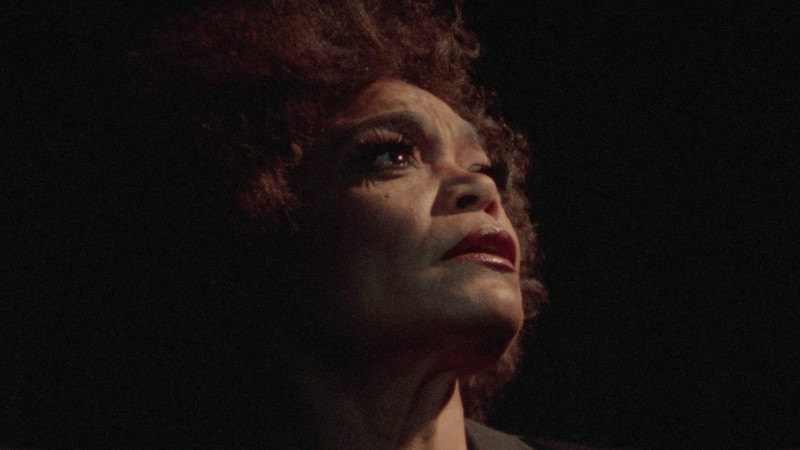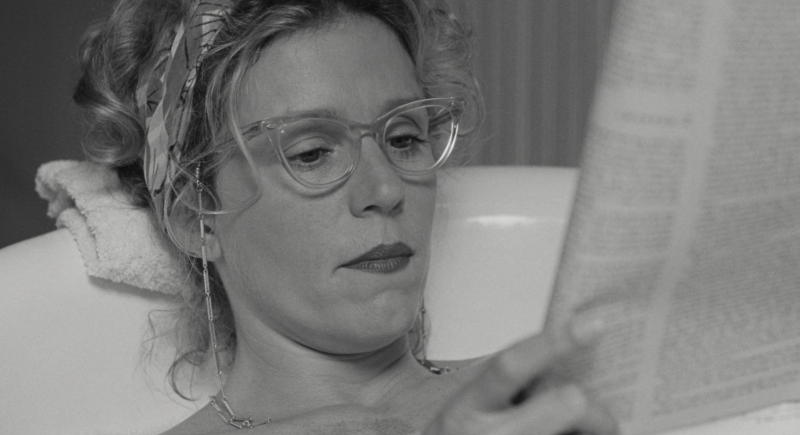Fallen Child: Amy Wright in Wise Blood

Amy Wright has big, round eyes and an ageless face. She was almost thirty when she acted in John Huston’s 1979 adaptation of Flannery O’Connor’s novel Wise Blood, but is wholly convincing as the preacher’s teenage daughter Sabbath Lily, who seduces the protagonist, Hazel Motes. Her eyes are what do it: liquid and slightly uneven, they turn downward as they widen, transforming her expression from childlike stubbornness into an almost too-pliable topography of peaks and valleys, rising colors and shifting lines. And Wise Blood is all about eyes: the angled, electric-blue eyes of Hazel (Brad Dourif), the would-be irreligionist who can’t escape faith; the scandalously seeing eyes of the supposedly blind evangelist Asa Hawks (Harry Dean Stanton), whom Hazel pursues, determined to unmask his falseness; and the gawking, desiring eyes of his daughter Sabbath Lily, which become the displaced focus of Hazel’s ecclesiastical obsession.
Asa and Sabbath Lily first appear in the midst of a street performance by a hawker of potato peelers that Hazel comes upon after arriving in the city, taking advantage of the crowd to proselytize. Though partially hidden by a black knit cap, Sabbath Lily’s gaze is as intense as Hazel’s; they stare each other down as he rips up her religious pamphlet. “I seen you,” she says, her mouth equal parts accusatory and lascivious. He follows them to their next spot, declaring that he isn’t “beholden to her fast eye.” O’Connor’s pungent language, adapted for the screen by Benedict and Michael Fitzgerald, is rife with ambiguity: Sabbath Lily’s “fast eye” is both moral judgment and instinctive lust, godly and demonic, and Hazel’s protestation that he isn’t “beholden” to it evokes both his willful rejection of religious belief and his discomfort with fleshly life. Wright’s face gets red as she attacks him with a screech, holding herself close behind Asa’s shoulder, but her eyes become teasing. They remain so when she opens the door of her and Asa’s one-room apartment to Hazel, who has followed them home to finish the confrontation, and they’re the first thing he comments on to her father: “I thought if your girl give me so much eye back there I’d come and return some of it.” “It was you give me the eye,” she retorts, without missing a beat. “You should have seen ’im, Papa, he looked me up and down,” she goes on more deliciously, taken with her own flirtatious fantasy. Later, breathlessly begging her father to help her “git him,” she’s alight with dizzy teen dream, her voraciousness undeterred by Hazel’s dismissals.
Sabbath Lily doesn’t let Hazel’s spiritual crises daunt her, nor does she care if he doesn’t much like her. If her transformation from severe daughter of Jesus to would-be sex kitten—a fairly familiar trajectory—reads not as cliché but rather as sui generis, and genuinely bizarre, it’s Wright’s performance we have to thank for it. She emerges from the knit cap of the street preacher’s daughter with a tonal and expressive shift (breathiness added to her voice; big, loopy gestures; an unhinged range of smiles) but retains a consistently ferocious ardor. Wright (the longtime partner of Rip Torn, who teaches acting at Uta Hagen’s HB Studio) is a great character actor with none of the mannerisms or self-consciousness that often attend that appellation. Part of the reason is that she never hesitates: her speech gushes out in an uninterrupted stream of intent.
To make her move on Hazel, Sabbath Lily leads him into a copse of browned trees. Plopping on the ground, her head cocked to one side, she shifts from plaintive virgin to cartoonishly provocative nymphet, imploring, “I can save you; I’ve got a church in my heart where Jesus is king,” while writhing in the dirt, her clothes covered with dead leaves. When she finally succeeds in overpowering him, her eyes glisten with giddy triumph, but it’s his she talks about, rising on her knees from his bed and puffing her hair in a parody of Bardot-style voluptuousness: “I said, look at those pecan eyes and go crazy, girl. That innocent look don’t hide a thing. It’s just pure filthy right to the guts like me. The only difference is I like being that way and you don’t.”
Unlike Hazel, Sabbath Lily has needs that are flexible; she knows what she wants in each moment but doesn’t mind changing course when something new arrives. When she uncovers what Hazel’s familiar, a needy country boy named Enoch Emery (Dan Shor), decides is “the new Jesus,” a mummified dwarf stolen from an anthropological museum, she hesitates only for a second before turning it into a “right cute” little baby, yelping and grinning, and then styling herself as the Virgin, pulling her sweater over her head and cradling the mummy as in a medieval icon. “Call me Mama now,” she teasingly tells Hazel, who responds by throwing her baby furiously against the wall. Then her playacting turns real: her face contracts in genuine rage—“I knew you were mean enough to slam a baby against a wall!”––and crying, she runs out of the room.
Sabbath Lily comes to represent the satanic opposite of Hazel’s pain-riddled redemption, after he’s blinded himself with lye, submitting his body and soul to the Lord: she’s a nonvirgin Mary with a dead baby Jesus, embodying an inverted world. But she isn’t mocked by the film either; her deranged maternality in this scene is weirdly touching as well as discomfiting. Sabbath Lily is a delightful as well as disruptive presence, and we always want more of her, much like Wright herself, an ever-surprising actor who fills each scene she’s in with intricate reactiveness and richness of purpose, but who has never gotten the recognition, let alone the roles, she deserves.
In her first scene alone with Hazel, Sabbath Lily pops up from the backseat of his car with flowers in her hair like a demented maypole dancer, her face smeared with makeup, and launches into an unprompted monologue about what she styles as her guiding principle: if she’s a bastard, and thus damned from the start, why should she bother avoiding any pleasure life throws her way? Faux-prim but seething with libidinous glee, she barrels over his protestations with such exuberance that it’s impossible not to root for her undeniably misguided designs.




